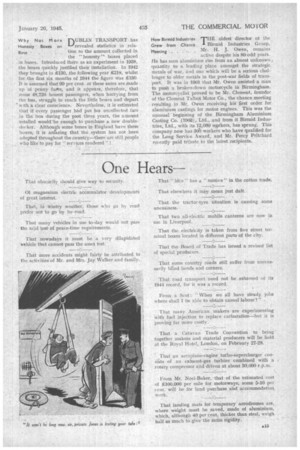One Hears
Page 17

If you've noticed an error in this article please click here to report it so we can fix it.
That obscurity should give way to security. • .
Of magnesium electric accumulator developments of great interest.
Thai, in Wintry weather, those who go by 'Mad prefer not to go by by-road. • That many vehicles in use to-day would not pass the acid test of peace-time requirements.
That nowadays it must be a very dilapidated vehicle that cannot pass the asset test.
That more accidents might fairly be attributed to the activities of Mr. and Mrs. Jay Walker and family. That '' ldco " has a " motive " in the cotton trade. That elsewhere it may mean just daft.
That the tractor-tyre situation is causing some uneasiness, That two all-elearic. mobile canteens are now in use in Liverpool.
That the electricity is taken from five street terminal boxes located in different parts of the city.
That the -Board. of Trade -has issued a revised list of speCial producers..
That some country roads still suffer from unecessadly blind bends and corners.
That road transport need not be ashamed of its 1944 record, for it was a recOrd.
From a Scot: "When we all have steady jobs where shall I be able to obtain casual labour?"
That many American makers are experimenting with fuel injedtion to replace carburation—but it is proving far more costly.
That a Caravan Trade Convention to bring together makers and material producers will be held at the Royal Hotel, London, on February 27-28.
That an aeroplane-engine turbo-supercharger consists of an exhaust-gas turbine combined with a , rotary compressor and driven at about 30,000 r.p.m.
From Mr. Noel-Baker, that of the estimated' cost of £100,000 per mile for motorways, Some 5-10 per cent, will will be for land purchase and accommodation That landing mats for temporary aerodromes are, where weight must be saved, made of aluminium, which, although 40 per cent. thicker than steel, weigh half as much to give the sathe rigidity.




















































